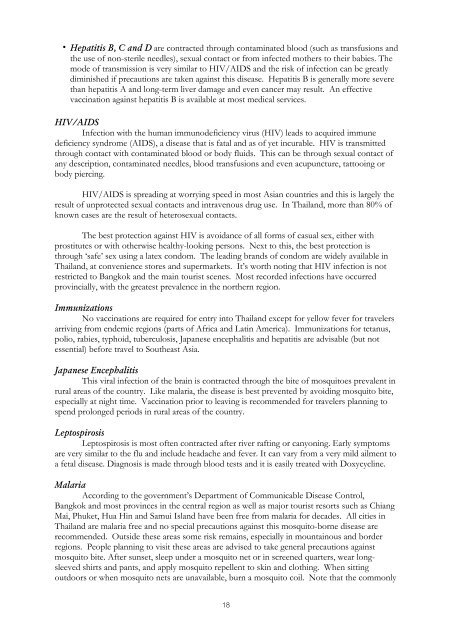INFORMATION KIT - Api-fellowships.org
INFORMATION KIT - Api-fellowships.org
INFORMATION KIT - Api-fellowships.org
- No tags were found...
You also want an ePaper? Increase the reach of your titles
YUMPU automatically turns print PDFs into web optimized ePapers that Google loves.
• Hepatitis B, C and D are contracted through contaminated blood (such as transfusions andthe use of non-sterile needles), sexual contact or from infected mothers to their babies. Themode of transmission is very similar to HIV/AIDS and the risk of infection can be greatlydiminished if precautions are taken against this disease. Hepatitis B is generally more severethan hepatitis A and long-term liver damage and even cancer may result. An effectivevaccination against hepatitis B is available at most medical services.HIV/AIDSInfection with the human immunodeficiency virus (HIV) leads to acquired immunedeficiency syndrome (AIDS), a disease that is fatal and as of yet incurable. HIV is transmittedthrough contact with contaminated blood or body fluids. This can be through sexual contact ofany description, contaminated needles, blood transfusions and even acupuncture, tattooing orbody piercing.HIV/AIDS is spreading at worrying speed in most Asian countries and this is largely theresult of unprotected sexual contacts and intravenous drug use. In Thailand, more than 80% ofknown cases are the result of heterosexual contacts.The best protection against HIV is avoidance of all forms of casual sex, either withprostitutes or with otherwise healthy-looking persons. Next to this, the best protection isthrough ‘safe’ sex using a latex condom. The leading brands of condom are widely available inThailand, at convenience stores and supermarkets. It’s worth noting that HIV infection is notrestricted to Bangkok and the main tourist scenes. Most recorded infections have occurredprovincially, with the greatest prevalence in the northern region.ImmunizationsNo vaccinations are required for entry into Thailand except for yellow fever for travelersarriving from endemic regions (parts of Africa and Latin America). Immunizations for tetanus,polio, rabies, typhoid, tuberculosis, Japanese encephalitis and hepatitis are advisable (but notessential) before travel to Southeast Asia.Japanese EncephalitisThis viral infection of the brain is contracted through the bite of mosquitoes prevalent inrural areas of the country. Like malaria, the disease is best prevented by avoiding mosquito bite,especially at night time. Vaccination prior to leaving is recommended for travelers planning tospend prolonged periods in rural areas of the country.LeptospirosisLeptospirosis is most often contracted after river rafting or canyoning. Early symptomsare very similar to the flu and include headache and fever. It can vary from a very mild ailment toa fetal disease. Diagnosis is made through blood tests and it is easily treated with Doxycycline.MalariaAccording to the government’s Department of Communicable Disease Control,Bangkok and most provinces in the central region as well as major tourist resorts such as ChiangMai, Phuket, Hua Hin and Samui Island have been free from malaria for decades. All cities inThailand are malaria free and no special precautions against this mosquito-borne disease arerecommended. Outside these areas some risk remains, especially in mountainous and borderregions. People planning to visit these areas are advised to take general precautions againstmosquito bite. After sunset, sleep under a mosquito net or in screened quarters, wear longsleevedshirts and pants, and apply mosquito repellent to skin and clothing. When sittingoutdoors or when mosquito nets are unavailable, burn a mosquito coil. Note that the commonly18
















